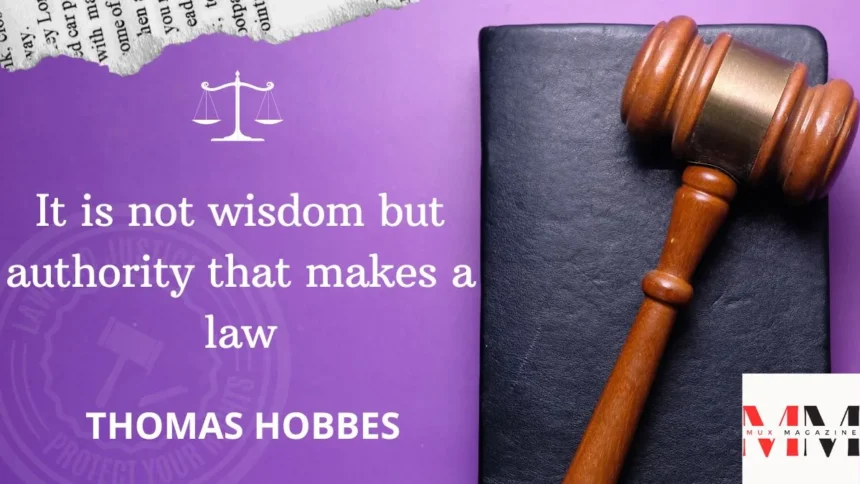Introduction of It Is Not Wisdom But Authority That Makes a Law. T – Tymoff
The statement “it is not wisdom but authority that makes a law. t – tymoff” poses a provocative exploration into the foundational principles of lawmaking. This notion challenges the traditional paradigm that laws are the culmination of collective wisdom, deliberation, and moral judgment. Instead, it propels us to confront the reality that, at its core, the legitimacy of a law may rest more heavily on the authority that enacts and enforces it, rather than the wisdom or ethical considerations it embodies. This perspective invites a critical examination of the dynamics between authority and wisdom in the legislative process, urging us to scrutinize the mechanisms through which laws are birthed and their implications on society.
Navigating the Currents of Law with Authority

To understand the dynamic between authority and wisdom in lawmaking, one must first delineate the concept of authority in this context. In the sphere of governance, authority represents the legitimate power to create and enforce laws. It is derived from the mandate of the sovereign, the consent of the governed, or the construct of democratic institutions. Authority transcends personal judgment and becomes a mantle vested in those who govern, influencing the very essence of law.
Defining Authority in the Governance Mechanism
Authority is the heartbeat of the legislative process, providing directives that are inherently respected and followed by citizens. It steers the process with a steely resolve, drawing from various fonts such as constitutional norms, legal precedents, and the socio-political zeitgeist. This unyielding aspect of authority is what gives law its weight and governs societal behavior.
Authority as a Driver of Legitimacy
Furthermore, authority bestows laws with legitimacy. When laws are made by those empowered to do so, they carry the imprimatur of the state, and by extension, the people. This imbues them with a special kind of power, the acquiescence of the majority, and the potential to be respected, even in the face of criticism.
The Role of Wisdom in Guiding Law

Wisdom, when paired with authority, is the lodestar that guides the ship of state through treacherous waters. Where authority represents the engine of the legislative process, wisdom is its compass, directing it towards the common good with sagacity and insight.
Reflecting on the Wisdom of Sages
The wisdom reflected in laws can be drawn from the collective consciousness of a nation, the ethical paradigms that have withstood the test of time, or the expertise of subject matter specialists. Wisdom in lawmaking calls upon historical perspectives, examines long-term consequences, and aims to lay the groundwork for a just and harmonious society.
When Wisdom Lends Clarity to Authority
There are instances when a law built on wisdom serves not only to enforce but to educate, inspire, and lead. These laws are the embodiment of reasoned discourse and informed decisions, meant to elevate society and mold it in a direction that prepares for a resilient, collective future.
Authority’s Power and Influence

- Authority alludes to the power or control an individual or gathering has over others.
- In numerous social orders, authority is viewed as a type of strength, where those in, influential places can direct and implement rules and guidelines.
- The idea of power has been available all through mankind’s set of experiences, with various types of authority and administration arising as social orders advanced.
- Authority can be given through different means, like legacy, political decision, or arrangement. Those in, influential places are frequently expected to decide and make moves that are to the greatest advantage of society overall.
Authority vs. Wisdom in the Legislation Arena

A dichotomy sometimes arises between laws crafted to assert authority and those that embody wisdom. Authority-driven laws may prioritize expediency and immediate needs, often at the expense of nuance and long-term perspective. Wisdom-driven laws, on the other hand, might require patience to gather the needed insight and courage to resist the exigencies of the moment.
The Immediacy of Authoritative Edicts
Authoritative laws often arise in response to crises or serve as reactionary measures to societal shifts. Their swift implementation and enforcement can be necessary to maintain order, but they may lack the depth and foresight required for lasting and beneficial impact.
Wisdom’s Quiet Path to Lawmaking
Laws formed by wisdom are often heralded by their capacity to tackle complex problems, address systemic challenges, and promote social harmony. They may demand intense scrutiny, public engagement, and multi-stakeholder input, which can prolong the legislative process but often result in measures with broader societal support and effectiveness.
Case Studies in Policy Formulation
By examining contrasting case studies of authoritative and wisdom-laden laws—perhaps, a mandate that rapidly responds to an environmental crisis versus a legislative initiative fortified by empirical research over several years—we can begin to unravel the distinct tapestries they weave and the varied legacies they leave behind.
The Profound Implications of Authority-Driven Laws

Laws birthed in the cauldron of authority can carry profound implications for society, sometimes serving as flashpoints that reveal not just the extent but the prowess of governance. However, these fast-tracked laws are not without their share of controversies and pitfalls.
Societal Reactions and Consequences
The rapid implementation of laws by sheer authority often triggers equal and opposite reactions from segments of society. This can lead to discontent, civil unrest, and legal challenges that may undermine the very legislation meant to assert control.
Navigating the Maze of Power Dynamics
Furthermore, authority-driven laws can sometimes betray the power dynamics at play in a given society, spotlighting the influence of various factions in the legislative process and the potential manipulation of laws to consolidate power or serve narrow interests.
Addressing the Challenges and Limitations
Charting the course through these challenges requires a keen appreciation of the balance needed to wield authority responsibly in the creation of laws. This is not merely the domain of legal experts but a societal endeavor that hinges on the engagement of the citizenry and rigorous checks and balances.
Politics Requires Authority over Consensus:

- In governmental issues, authority is fundamental for keeping everything under control and strength.
- Without definitive figures, there would almost certainly be disarray and clashing feelings.
- Agreement building can be troublesome in political settings, as there are in many cases different and contradicting sees.
- Authority considers choices to be made and moves to be initiated, regardless of whether not every person concurs with them.
- It likewise guarantees that regulations and guidelines are adhered to and implemented.
- In fair social orders, authority is gotten from the assent of the represented.
- Nonetheless, even in these frameworks, there is as yet a requirement for definitive figures to keep everything under control and go with hard decisions.
- Without power, it would be trying to accomplish progress and order change in the public arena.
- While agreement building is great, it isn’t generally attainable or viable in governmental issues.
- Eventually, the strength of power is fundamental for the working and soundness of political frameworks. Along these lines, one might say that legislative issues requires authority over agreement.
- This doesn’t mean, nonetheless, that agreement ought to be ignored completely.
- Definitive figures actually must think about different points of view and take a stab at compromise whenever the situation allows.
Striking a Harmonious Chord with Balanced Legislation

The most effective laws are often those that strike a harmonious chord between authority and wisdom. Integrating these elements ensures that the laws created are both potent in their implementation and profound in their foresight.
Recognizing the Synergy of Authority and Wisdom
Laws constructed with the fusion of authority and wisdom recognize the need for swift action in certain contexts while also honoring the requisite for informed judgment and public trust in others. This blend can produce laws that are not just obeyed but respected and embraced by the populace.
Fostering Inclusivity and Public Participation
An essential aspect of achieving this balance lies in fostering public participation and inclusivity in the legislative process. This not only enriches the decision-making but also serves to legitimize the resulting laws in the eyes of the governed.
Conclusion: It is not wisdom but authority that makes a law
In conclusion, the transcation between wisdom and authority in the realm of lawmaking is a complex and nuanced affair. The adage “it is not wisdom but authority that makes a law. t – tymoff” fills in as a strong sign of the power elements at play inside official cycles. While intelligence should direct the ethos and bearing of regulations, at last, authority sanctions and upholds these guidelines inside society.
This doesn’t decrease the worth of shrewdness in lawmaking yet rather features the need for a decent methodology where authority is employed with a significant comprehension of its grave liabilities. Thus, the creation and execution of regulations request a sensible blend of both power and shrewdness to guarantee that administration is both viable and edified, serving the wellbeing of the general public it tries to sort out and secure.
FAQs about It is not wisdom but authority that makes a law
What does the statement “It is not wisdom but authority that makes a law” imply?
The assertion underscores that the authenticity and requirement of regulations are transcendently supported by the power of the people who make and carry out them, as opposed to the insight or moral honorableness those regulations might typify. It proposes that power elements, as opposed to edified pondering, assume a pivotal part in the official cycle
How can authority override wisdom in lawmaking?
Authority can override wisdom in lawmaking when decisions are made based on political power, urgent needs, or to maintain control, rather than through thoughtful consideration and the pursuit of the common good. In such scenarios, the immediate mandate of those in power takes precedence over comprehensive analysis and ethical judgment.
Can laws formed by authority still be effective and just?
Yes, regulations framed by power can in any case be successful and only, especially in circumstances requiring quick activity, for example, during crises. In any case, the test lies in guaranteeing that such regulations are not exclusively an impression of force but rather are likewise directed by standards of equity, reasonableness, and public government assistance.
What are the potential drawbacks of lawmaking driven purely by authority?
Lawmaking driven simply by power can prompt an absence of public trust and cooperation, as it may not necessarily in all cases consider the different necessities and viewpoints of the populace. Besides, it gambles making regulations that serve the interests of a limited handful as opposed to cultivating shared concordance and equity.
How can the balance between authority and wisdom in lawmaking be achieved?
Accomplishing a harmony between authority and wisdom in lawmaking requires a multipronged approach, including cultivating public commitment, guaranteeing straightforwardness in the regulative cycle, and executing balanced governance to forestall the abuse of force. Furthermore, uplifting a culture of thought and informed discussion can assist with guaranteeing that regulations are both definitive and savvy.










